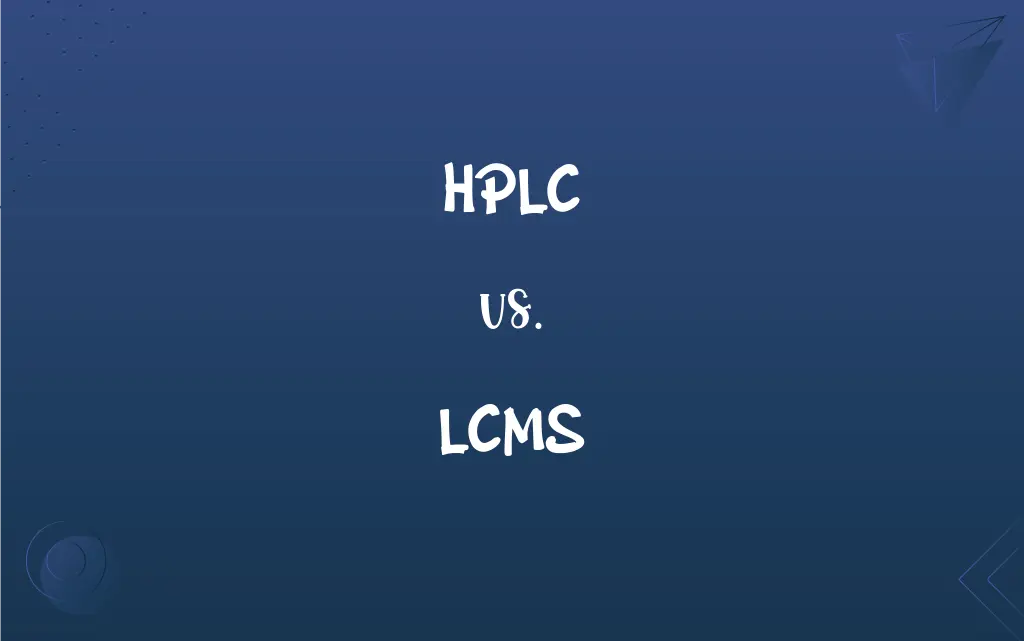HPLC vs. LCMS: What's the Difference?
Edited by Aimie Carlson || By Janet White || Published on February 14, 2024
HPLC (High-Performance Liquid Chromatography) separates components in a mixture, while LCMS (Liquid Chromatography-Mass Spectrometry) separates and then identifies and quantifies them using mass spectrometry.

Key Differences
HPLC (High-Performance Liquid Chromatography) is a technique used to separate, identify, and quantify each component in a mixture. It relies on pumps to pass a pressurized liquid solvent containing the sample mixture through a column filled with a solid adsorbent material. Each component in the sample interacts slightly differently with the adsorbent material, causing different flow rates for the different components and leading to the separation of the components as they flow out of the column.
LCMS (Liquid Chromatography-Mass Spectrometry) combines the physical separation capabilities of liquid chromatography with the mass analysis capabilities of mass spectrometry. LCMS is unique in its ability to identify different substances within a test sample. After the liquid chromatography separates the sample components, the mass spectrometry part measures the mass-to-charge ratio of the molecules, which helps in identifying the chemical structure of the compounds.
HPLC is known for its high resolution and precision in separating complex mixtures. It is widely used in various fields such as pharmaceuticals, environmental testing, and food analysis. The key advantage of HPLC is its ability to analyze non-volatile and thermally fragile molecules.
LCMS, on the other hand, is particularly useful when the chemical structures of the compounds in the mixture are unknown. LCMS can provide molecular weights and sometimes structural information of the separated compounds. It is extensively used in drug development, biochemical research, and toxicology.
HPLC excels in separation efficiency, while LCMS extends these capabilities by adding the power of mass spectrometry, which allows for the identification and quantification of compounds with a high degree of specificity and sensitivity.
ADVERTISEMENT
Comparison Chart
Primary Function
Separation of compounds
Separation followed by identification
Analyte Information
Limited to retention times
Provides mass-to-charge ratios
Sensitivity
High
Higher, due to mass spectrometry
Compound Requirements
Non-volatile, thermally stable
No such specific requirement
Application Fields
Pharmaceuticals, food analysis
Drug development, biochemical research
ADVERTISEMENT
HPLC and LCMS Definitions
HPLC
HPLC operates by passing a pressurized liquid solvent containing the sample mixture through a column.
The scientist adjusted the HPLC settings for optimal solvent flow rate.
LCMS
LCMS is used for both qualitative and quantitative analysis.
The research team used LCMS to quantify the drug metabolites.
HPLC
HPLC is known for its accuracy in quantifying and identifying compounds.
HPLC provided precise measurements of each substance in the mixture.
LCMS
LCMS provides detailed molecular information of substances.
Through LCMS, the molecular weight of the new compound was determined.
HPLC
HPLC is essential for analyzing complex mixtures in various industries.
Environmental agencies use HPLC to detect pollutants in water samples.
LCMS
LCMS is ideal for complex mixtures where exact identification is crucial.
LCMS helped in detecting trace elements in the forensic samples.
HPLC
HPLC is a powerful tool in chemical analysis, particularly in pharmaceuticals.
The pharmaceutical company relies heavily on HPLC for quality control.
LCMS
LCMS combines liquid chromatography with mass spectrometry.
LCMS was instrumental in identifying unknown compounds in the sample.
HPLC
HPLC is a method for separating substances in a liquid mixture.
The lab used HPLC to analyze the components in the new drug.
LCMS
LCMS is widely used in drug development and biochemical research.
LCMS analysis was a key step in the new cancer drug research.
LCMS
Plural of lcm
FAQs
What is the primary use of HPLC?
HPLC is primarily used for separating and analyzing components in a liquid mixture.
Can HPLC analyze volatile compounds?
HPLC is best suited for non-volatile and thermally stable compounds.
What are the advantages of HPLC?
HPLC offers high resolution, precision, and is suitable for a wide range of compounds.
What does HPLC stand for?
HPLC stands for High-Performance Liquid Chromatography.
Is HPLC used in environmental analysis?
Yes, HPLC is widely used in environmental testing to analyze pollutants.
How does LCMS differ from HPLC?
LCMS combines the separation capability of HPLC with mass spectrometry for compound identification.
Is LCMS suitable for identifying unknown compounds?
Yes, LCMS is excellent for identifying unknown compounds due to its mass spectrometry component.
Is LCMS more sensitive than HPLC?
Yes, LCMS is generally more sensitive due to its mass spectrometry detection.
What fields commonly use LCMS?
LCMS is commonly used in drug development, toxicology, and biochemical research.
What is the sensitivity level of HPLC?
HPLC has a high sensitivity for separating and detecting compounds.
What type of samples can be analyzed using LCMS?
LCMS can analyze a wide range of samples, including complex biological matrices.
Does LCMS require special sample preparation?
LCMS may require specific sample preparation to enhance detection and analysis.
What does LCMS stand for?
LCMS stands for Liquid Chromatography-Mass Spectrometry.
Can LCMS provide structural information?
LCMS can provide molecular weights and sometimes structural information of compounds.
Can LCMS analyze non-volatile compounds?
Yes, LCMS can analyze both volatile and non-volatile compounds effectively.
What are the limitations of HPLC?
HPLC can be limited in identifying compounds without additional detectors.
What makes LCMS unique in analytical chemistry?
LCMS's ability to provide both separation and detailed molecular identification makes it unique.
Are HPLC and LCMS complementary techniques?
Yes, HPLC and LCMS are often used together as complementary techniques for thorough analysis.
Can HPLC determine the molecular weight of compounds?
HPLC typically does not provide molecular weight information; it focuses on separation.
Can HPLC analyze thermal labile compounds?
HPLC is suitable for thermally labile compounds, unlike gas chromatography.
About Author
Written by
Janet WhiteJanet White has been an esteemed writer and blogger for Difference Wiki. Holding a Master's degree in Science and Medical Journalism from the prestigious Boston University, she has consistently demonstrated her expertise and passion for her field. When she's not immersed in her work, Janet relishes her time exercising, delving into a good book, and cherishing moments with friends and family.
Edited by
Aimie CarlsonAimie Carlson, holding a master's degree in English literature, is a fervent English language enthusiast. She lends her writing talents to Difference Wiki, a prominent website that specializes in comparisons, offering readers insightful analyses that both captivate and inform.







































































